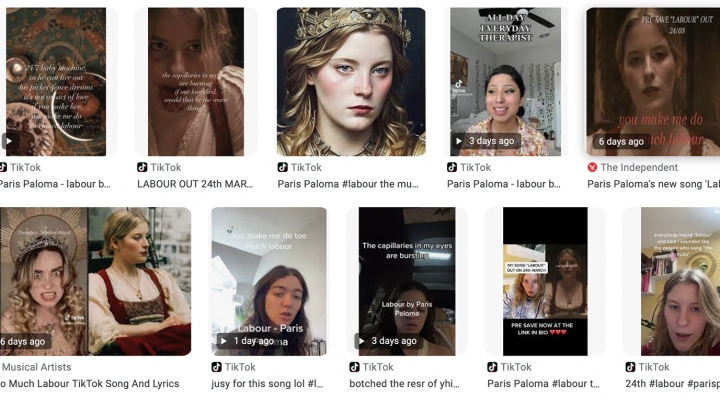This year, the women of TikTok are celebrating Women’s History Month in a unique way. They are openly expressing what they call “feminine rage” using a snippet of the unreleased song “Labour” by Paris Paloma.
In 1980, following lobbying efforts from “a consortium of women’s groups and historians,” the week of March 8 was declared National Women’s History Week by President Jimmy Carter. Seven years later in March 1987, Public Law 100-9 was passed by Congress designating the entire month of March as Women’s History Month. The month-long celebration is intended to serve as a time for Americans to educate themselves on women’s history, become more informed on gender-based discrimination and reflect on what progress has been and still needs to be made.
The original 28-second TikTok clip is currently gaining popularity, depicting a singing woman dressed in domestic clothes with a classic, homemaker-esque hairstyle. The lyrics read:
“All day, every day. Therapist, mother, maid.
Nymph then a virgin, nurse then a servant.
Just an appendage, live to attend him, so that he never lifts a finger.
24/7 baby machine, so he can live out his picket-fence dreams.
It’s not an act of love if you make her, you make her do too much labor.
The capillaries in my eyes are bursting. If our love died, would that be the worst thing?”
The song grieves the gender-based discrimination that afflicts every aspect of women’s lives, all the way down to the imbalance of work and effort placed on women in heterosexual romantic relationships. Although the song has yet to be released, other women across TikTok are using the sound to make videos about their shared feelings of anger. They are re-using the soundbite but placing it onto their own videos to express how the song reminds them of previous experiences of gender-based discrimination.
What’s their complaint?
In 2023, in a society and world that has been fighting to achieve equality for decades, what do these women have to complain about? Looking through the laments on TikTok, there is a lot.
Some women are acting out the historical journey of women’s rights activism in America. One woman passionately translated the song into American Sign Language. Other women are using the sound to share stories, one of how the girls in their classes were discriminated against by teachers at school, another of how their bodies have been objectified since childhood.
Many women are using the soundbite to share stories of religious trauma. One woman tells the story of how she discovered her calling into ministry, only to be told by church leaders that given her clear theological gifts, since women could not be pastors themselves, she may actually be called to be a pastor’s wife.
“Women’s capability of working hard is not the problem here. It is for whom this work is being done.”
These women on TikTok are not just complaining about how much work they must do, or how hard their work is. They are expressing the ways in which they cannot escape both externalized and internalized gender biases as they carry out this work. Women’s capability of working hard is not the problem here. It is for whom this work is being done.
Women are taking on a majority (and at times, all) of the child care, cooking, cleaning and other domestic tasks while their husbands arrive home from work to their hot meal, comfortable couch and TV shows.
Men expect women to deliver sexual gratification to them whenever they please, and yet women are only desirable if they are virgins. Women are viewed as gross if they have (or appear to be having) sex for their own pleasure, obedient if they deliver sex to the men who ask for it, but promiscuous if they say yes to too many.
They are becoming mothers, putting their bodies through months of dramatic change followed by traumatic and sometimes dangerous births. Then, jump immediately into a laborious parenting role where they often take on more daily responsibilities than their husbands, despite their barely healed bodies.
As the song and the women using it on TikTok point out, women are not incapable of these things, but they are being asked to carry too much of the weight of these laborious tasks, while men too often carry little of it.
Men, in contrast, are expected to explore their career options, follow their ambitious desires and be lucrative. Consider the last time a man you know spent his day off catching up on laundry and grocery shopping. Or, how often fathers are the primary contact for schools when their child needs to go home sick. Most of the time, it is the women and mothers who take on these extra roles.
“Consider the last time a man you know spent his day off catching up on laundry and grocery shopping.”
And when women do explore their own goals and aspirations outside domesticity, they must perform so well that their skills and abilities outweigh the implicit and explicit biases of those in professional power over them. If they want promotions, rewards and notoriety, they must go beyond the efforts of the men receiving these benefits beside them.
Then, after putting in this effort, they go home to complete additional tasks of domestic labor which their fathers, brothers and husbands are often never taught or prompted to consider helping out with.
Some women participating in the trend noticed this discrepancy in expectations going back to childhood and adolescence, recalling how they learned to do laundry, cook or clean, all while watching their fathers and older brothers leave dirty clothes on the floor and litter dishes around the home without batting an eye to the girls who were cleaning up after them.
Women following the trend at home know these stories all too well. The soundbite has been used for 15,900 posts, and the original video has more than 900,000 likes and more than 5 million views and has been shared more than 76,000 times. This rage is hitting home.
This is a familiar story to me
And it is familiar for me, too.
When I began discerning my calling into ministry, I was prompted to consider children’s ministry, but never asked if I wanted to be a lead pastor. Instead, I was frequently questioned by confused men who could not imagine the “pastor’s husband” being a role, and asked to clarify whether I would one day marry a man who also was practicing Christian ministry. When I first began considering ministry as a calling, I was 15. The men telling me these things were adults.
It was not until I got to college that my professors began telling me I should consider roles like senior pastor, hospital or military chaplain or professor of religion.
As I began this journey into college, I was asked by an ex-boyfriend not to pursue a master of divinity degree. He felt, by obtaining post-graduate education, I would be intellectually pressuring him into obtaining a Ph.D. in religion for himself. Why? He wanted to ensure that, if we were to get married in the future, his knowledge of Christianity surpassed his wife’s.
“My experiences were so common there was a name for them.”
Not long into my undergraduate religious studies major, I learned the term “complementarianism” and realized these gender-based comments were not unique in the greater debates on women in Christian church life and theology. My experiences were so common there was a name for them. Further, the women before and beside me had already set a stage of resistance to these biases.
To be clear, these roles are not good for men either. They make it difficult for boys to foster independence by allowing them to become dependent on the women around them for the completion of basic tasks.
For example, while living on campus, I and other women I know have spent ample time teaching boys — now tasked with self-care tasks their mother is too far away to complete — how to do laundry or iron their clothes.
Paris Paloma’s soundbite is emblematic of the female experience, offering a description of and outlet for this collection of stories of “feminine rage.”
Unintentionally, women learn to take on extra domestic roles that fathers, brothers and boyfriends do not think to do, and that mothers and the other women in our lives are modeling. As we age, this labor is solidified into our daily routines, going unnoticed until another woman on TikTok points it out to us, or until we grow so tired that we become enraged.
This imbalance is woven into the gender roles of our society, and often even the most responsible of women and men fail to see it. The women and men who support women’s rights, call themselves feminists and condemn sexism even fall subject to these assumed responsibilities which bear extra weight on us women. But this Women’s History Month, the women of TikTok are not letting their labor go unseen.

Mallory Challis
Mallory Challis is a senior at Wingate University and currently serves as BNG’s Clemons Fellow.


